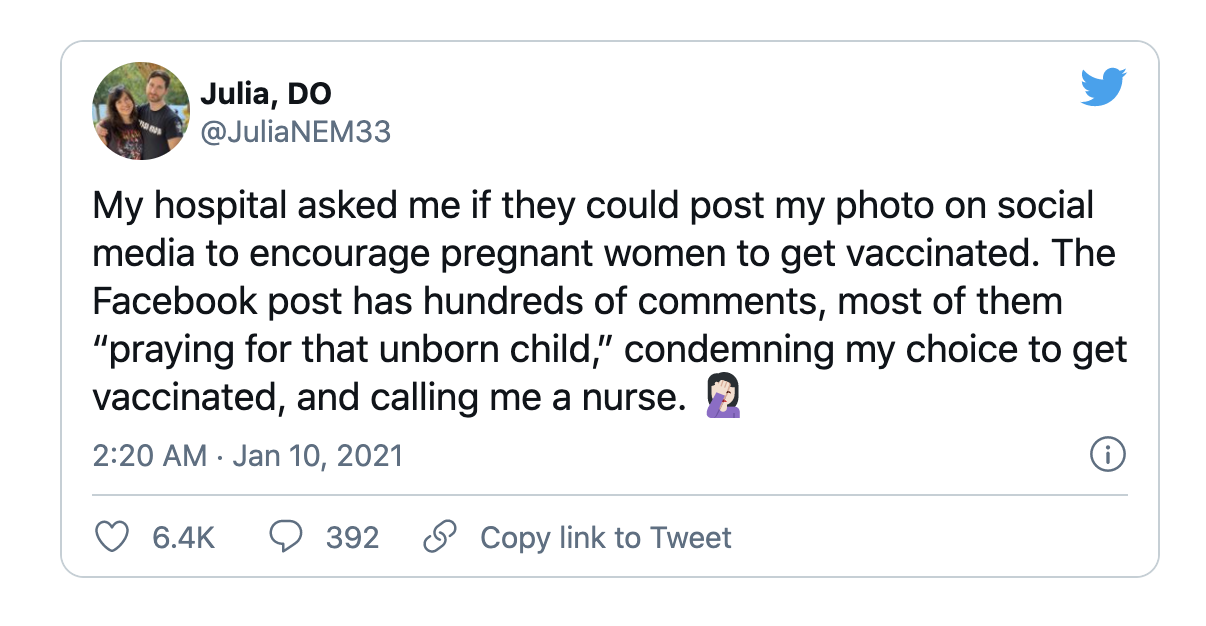Misinformation Surrounding The Covid Vaccine And Infertility
The Covid vaccine should be reassuring the fears surrounding the global pandemic, but due to misinformation, many women are feeling hesitant about getting the jab.

![[object Object]](./assets/hAhSQVgmzy/p5020699-2560x3413.jpeg)
Melbourne IFV on Sunday, May 2, 2021. (Kaylah Baker)
Melbourne IFV on Sunday, May 2, 2021. (Kaylah Baker)
![[object Object]](./assets/JCeasJIizK/img_4893-880x1280.jpeg)
Newborn baby with her Mother on Sunday, May 2, 2021. (Kaylah Baker)
Newborn baby with her Mother on Sunday, May 2, 2021. (Kaylah Baker)
Late 2020, the news of a Covid-19 vaccine being in progress was announced to the public. But the eagerness soon wore off when German physician Wolfgang Wodarg and former Pfizer employee, Michael Yeadon, requested for the European Medicines Agency to delay the vaccine trial.
The petition for the study to be stopped was due to claims the vaccine could cause the body to make antibodies against a protein called syncytin-1. This protein is essential for placental formation and if this does occur then a women could become infertile.
And while the claims have consistently been debunked by researchers, specialists and fact-check sites, such as Reuters Fact Check, misinformation continues to circulate.
Dr Alex Polyakov is a Fertility specialist at a Melbourne IVF clinic, and is adamant the claims surrounding the vaccine and infertility are not true.
“There is no physiological way for that to be true. There is no studies to depict it’s true,” he said.
When addressing the impact of the claim, Dr Polyakov is quick to share the harm misinformation and disinformation is having on young women around the globe.
“Any disinformation in relation to fertility is harmful in the sense that it may prompt people to act against their best interests. If a pregnant woman gets covid and gets really unwell it would have a much higher impact on her pregnancy than having a vaccine,” he said.
The Australian Government has also spoken out on health.gov.au in regards to the claims surrounding infertility, stating “The Therapeutic Goods Administration will not approve a vaccine for use in Australia unless it is safe and effective. This includes impacts on fertility”.
Despite the research surrounding infertility and the vaccine claiming it is safe, many people are turning to social media for their information.
In the U.S, town hall meetings were held for healthcare workers and staff from the Skilled Nursing Facility (SNF) to discuss fears related to the Covid-19 vaccine. Across all the meetings, infertility and pregnancy concerns were reported as one of the most frequently raised questions from staff in attendance.
Most staff reported getting their information from social media.
Also struggling to navigate the misinformation online is Miriam Wilckens, a 27 year old mother who hopes to one day have another child. Like many other young women, she is struggling to be reassured the claims are false when she is constantly bombarded online with information.
“It is hard to not be influenced by the bold claims and then the conversations that come out of it. It is hard not to get caught up in it and not take other peoples word on social media as gospel truth,” she said.
Unfortunately, social media is becoming the common link for how people are hearing misinformation. And it doesn’t take long to find these bold claims when they are circulating on Twitter, Facebook and Instagram.
On Facebook, a Ghanaian journalist by the name of Bridget Otoo uploaded a Facebook post to her 84,000 followers stating she would not get the vaccine as she “[didn’t] have a kid”. This suggestion created a lot of uncertainty for her followers and the video has since been deleted due to being flagged by GhanaFact.
On Instagram a viral post was also circulating, claiming Family Medicine Physician Michelle Rockwell had caused her miscarriage by getting the vaccine three weeks prior. In reference to the post, she claimed “they changed the dates of [her] vaccine and misinformation to fit in with their agenda”. Interestingly, despite the post constantly being re-shared, no one cared to check her social media feed to see she actually had the miscarriage prior to ever getting the vaccine.
The re-spreading of false information is becoming so harmful for many individuals. On Twitter, one user described her confronting experience when she received a high-volume of harmful comments following a post the hospital had uploaded to encourage other pregnant women to get the vaccine. She claimed she had received hundreds of comments, with many saying they were “praying for [her] unborn child”.

@JuliaNEM33
@JuliaNEM33
As a reader and viewer of these posts, it is no surprise many people are feeling concerned when making the decision to get vaccinated or not. Social media can be a helpful tool to spread positive, important information but unfortunately many people are taking the responsibility too lightly.
Researching, fact-checking and being mindful of anything you share is so important these days. Many people can be hurt in the process of misinformation being spread and unfortunately for many young women around the world, this has been the case.
If have any concerns regarding the safety of the vaccine on infertility, check out health.gov.au for more information on the safety of vaccines administered in Australia or seek out advice from your Doctor.
